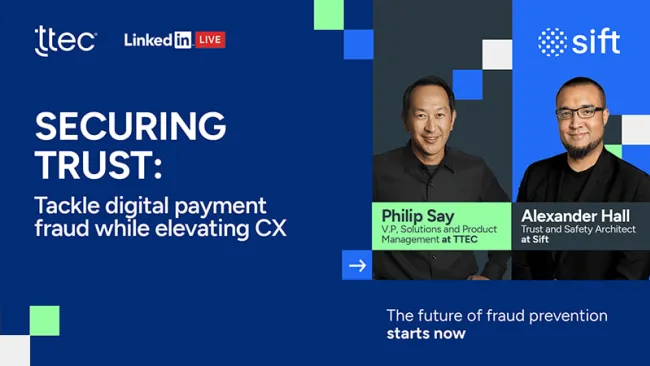It’s the busiest time of year for retailers – for sales, yes, but also for fighting fraud. Traffic to e-commerce sites and brick-and-mortar stores spikes in November and December, which unfortunately gives fraudsters more opportunities to wreak havoc.
Fraud is an expensive problem, with retailers spending $100 billion per year on fraud-related problems. Beyond the bottom-line impacts, fraud hurts customer loyalty, erodes customer satisfaction, and can significantly damage a brand’s reputation.
It’s a complex problem to tackle, especially as a growing number of retailers strive to offer generous refund and return policies in an effort to please their customers. But as fraudsters grow savvier they're increasingly taking advantage of these policies, causing a huge financial drain for brands.
So, how can retailers combat fraud in a way that protects their brand and keeps customer experience (CX) top of mind? The right mix of CX strategy, security expertise, and technology can help detect and prevent fraud.
Stay on top of your data with machine learning
Retailers have a huge amount of data at their fingertips: purchase histories, customer behavior patterns, buying trends, and more. Don’t let all that information go to waste; use it to detect and predict when fraud happens.
Machine learning models can comb large amounts of transaction data and identify any anomalies or unusual patterns that emerge – with a speed that human associates just can’t match on their own. This can help detect suspicious or fraudulent transactions, such as an unusually large purchase, multiple orders placed from the same device, or transactions from high-risk locations.
As soon as machine learning flags something as suspicious, it can hand that information off to a human fraud investigator who may be able to stop the fraudulent activity. Even more proactively, predictive analytics can use historical data and trends to predict fraudulent behavior before it happens, empowering retailers to take action even before any financial loss occurs.
With the right data analytics, you can monitor transactions in real-time, at a greater scale and much faster than human associates can. Machine learning can assess the risk associated with a transaction within milliseconds, letting you approve or decline purchases instantly based on the likelihood of fraud.
It also can analyze customer behavior patterns and alert you to any deviations from the norm, like if a customer changes his purchasing habits or location drastically. This can help flag instances of account takeover or identity theft. You can also use it to analyze customer communications, such as chat logs and email correspondence, and look for suspicious language or requests that could indicate fraud.
Keep evolving your fraud mitigation strategy
Fraudsters continue to grow smarter, so your security efforts must keep evolving and improving too. It’s not enough just to have the right fraud prevention strategies and tools in place; you need to continually take stock of what’s working, what’s not, and where you can close any gaps.
It’s not easy to stay ahead of the curve when it comes to fraud, but working with an experienced partner can help. A partner that has expertise in security, machine learning, and CX can help you proactively prevent fraud, stop it quickly when it happens, and ensure your customer data is safe – all while keeping your customer experience seamless.
Expert fraud protection in action
When a global online marketplace and auction site wanted to crackdown on fraud, it came to TTEC for help.
We established a team of front-line associates who observed trends in product listings on the site and shared those back with the client. Our observations and monitoring helped the company improve the algorithm it uses to filter suspicious or fraudulent listings. Anything flagged as suspicious was sent back to our agents for further investigation. With our help, the company improved the efficiency of their fraud detection filter by as much as 10%.
The site hosts product listings from various individual sellers, another aspect that opens it up to potential fraud. TTEC agents also worked with the company to establish guidelines that differentiate legitimate name-brand items from fake products. In addition to improving experiences for customers, these guidelines protected the company from potential legal actions that could result from bogus product sales.
A partner that has this type of deep knowledge and retail expertise can help you choose and implement the right combination of strategy, technology, and people to meet your unique needs.

















